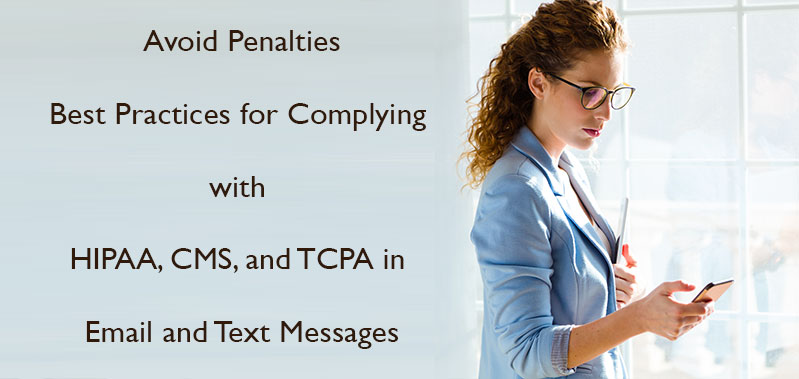
Avoid Penalties: Best Practices for Complying with HIPAA, CMS, and TCPA in Email and Text Messages
Healthcare providers and organizations need to navigate the intricate web of compliance rules with caution while exchanging information via email and text messaging in the rapidly evolving modern world. Serious financial fines, reputational harm, and possible legal actions may result from noncompliance with the requirements set out by the Health Insurance Portability and Accountability Act (HIPAA), the Centers for Medicare & Medicaid Services (CMS), and the Telephone Consumer Protection Act (TCPA). The main focus of the article is on how best practices can assist in preventing compliance issues by helping readers understand the significance of these requirements.
How to Comply with HIPAA, CMS, and the TCPA
When sending emails or text messages to patients or clients or trying to communicate in any way, it is important to meet the requirements of HIPAA, CMS, and TCPA. These rules and regulations are made to protect patient privacy, ensure proper use of healthcare data, and prevent unwanted or intrusive communications that can lead to data leaks.
1. HIPAA Compliance: Protecting Patient Information
HIPAA ensures the privacy and security of protected health information (PHI). Healthcare providers must take steps to protect any PHI shared via email or text messages, such as medical diagnoses, treatments, or personal health details. A major goal of the Security Rule is to protect the privacy of individuals' health information while allowing covered entities to adopt new technologies to improve the quality and efficiency of patient care. Given that the healthcare marketplace is diverse, the Security Rule is designed to be flexible and scalable so a covered entity can implement policies, procedures, and technologies that are appropriate for the entity's particular size, organizational structure, and risks to consumers' e-PHI.
Best Practices for HIPAA Compliance:
- Encryption: Today, providers are using clinical applications such as computerized physician order entry (CPOE) systems, electronic health records (EHR), and radiology, pharmacy, and laboratory systems. Health plans provide access to claims and care management, as well as member self-service applications. While using such a platform, the person should ensure that the platform offers end-to-end encryption.
- Patient Consent: Always get consent from patients while communicating with them or sharing any sensitive health information via email or text messages. The consent must explicitly state the mode of communication.
- Access Controls: Meet HIPAA and HITECH regulations for access, audit, integrity controls, data transmission, and device security
- Training Staff: Train staff on HIPAA regulations and make sure to follow these updates from those who monitor and enforce HIPAA compliance in order to ensure the safest environment. Communications are likely to provide guidance on the most prominent issues caused by the pandemic, such as increased appointments, data threats, and mitigation techniques.
2. CMS Guidelines: Communication for Healthcare Providers
CMS regulates and sets some rules on developing our communications in the Medicare Fee-for-Service provider portfolio to follow a sound strategy and set of guiding principles to ensure a consistent, accurate consumer experience for Medicare Fee-for-Service providers, regardless of the content's point of origin. especially those related to Medicare and Medicaid patients.
Best Practices for CMS Compliance:
- Appropriate Messaging: Ensure that all messages to patients are relevant, factual, and clearly state their purpose. Misleading or inaccurate information can result in non-compliance.
- Opt-In and Opt-Out Mechanisms: Patients must have the option to opt-in to receive communications and the ability to opt-out at any time without penalty.
- Audit and Documentation: Maintain clear records of all email and text communications to ensure accountability and easy access during audits.
3. TCPA Compliance: Consent and Unsolicited Communications
The TCPA regulates the use of automated phone calls and text messages, protecting individuals from unwanted solicitations. Under TCPA, healthcare providers must obtain express written consent before sending any promotional or marketing messages via text. Violating the TCPA can result in significant fines, with penalties ranging from $500 to $1,500 per unsolicited message.
Best Practices for TCPA Compliance:
- Obtain Express Consent: Ensure that patients or clients have explicitly consented to receive text messages or calls. This consent should be clearly documented and retained for future reference.
- Avoid Promotional Messages Without Consent: Avoid sending promotional or marketing messages unless express consent has been obtained. If the message is purely transactional or informational (e.g., appointment reminders), be sure to clarify this in the consent process.
- Clear Opt-Out Options: Each text message or email must include a clear and easy way for recipients to opt out of future communications, such as replying “STOP” to texts.
Integrated Compliance Strategy
To stay compliant with HIPAA, CMS, and TCPA, healthcare providers should integrate the following strategies into their communication practices:
- Create a Comprehensive Communication Policy: Develop a communication policy that covers email and text messaging procedures in line with HIPAA, CMS, and TCPA guidelines. Ensure that staff are familiar with this policy.
- Use Secure Platforms: Utilize communication platforms that are designed for healthcare compliance, offering features such as encryption and audit trails.
- Regular Audits and Reviews: Conduct regular audits of email and text communications to identify any potential compliance issues. Update policies and procedures as necessary to align with any changes in federal regulations.
Avoiding Penalties and Ensuring Compliance
Failing to comply with HIPAA, CMS, or TCPA can lead to substantial financial penalties. For example, HIPAA violations can range from $100 to $50,000 per incident, depending on the severity of the breach. TCPA fines are similarly hefty, and CMS audits can lead to costly repercussions if improper communication practices are uncovered.
Healthcare providers must remain vigilant in their communication practices and ensure that all staff members are properly trained. By taking proactive steps to comply with HIPAA, CMS, and TCPA, organizations can avoid penalties, protect patient privacy, and maintain the trust of their patients.
Conclusion
Complying with HIPAA, CMS, and the TCPA when communicating through email and text messages is critical for any healthcare provider or organization. By implementing best practices such as encryption, obtaining consent, and using secure communication platforms, healthcare professionals can avoid penalties and ensure that they are protecting patient privacy at every step.




